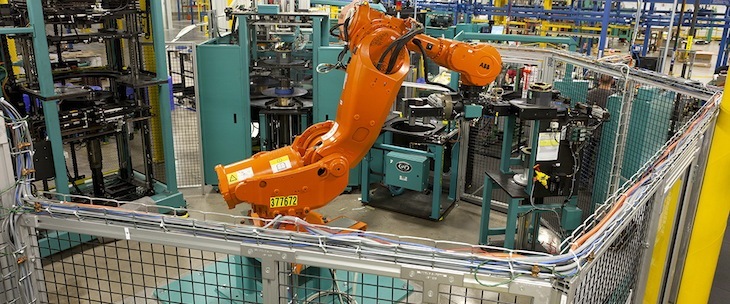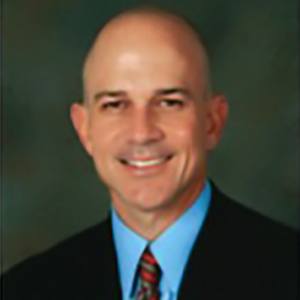Baldor exec: ‘Students need a plan and a skill’
by October 8, 2017 8:27 pm 887 views

A robot on the floor of ABB's manufacturing plant in Fort Smith.
Students today need to graduate high school with two things: a plan and a skill. That was the key takeaway from Jason Green, vice-president of human resources for Baldor, in his Friday (Oct. 6) address to the Fort Smith Regional Chamber of Commerce on the Arkansas Career & Workforce Development Initiative.
Green encouraged business leaders to stop giving away their old equipment to high schools and instead invest in today’s and tomorrow’s technologies
“So when it comes to Baldor donating equipment, I do not need to donate my old, outdated equipment. I may donate my current equipment, but I also need to donate the equipment that I’m going to be using five years from now because I’ve got to get that pipeline trained on future technology as well,” Green said
He added that manufacturing as a sector had not done itself favors in recruiting new talent over the years by building facilities without windows and failing to communicate the importance of what it does and the benefits employees may find.
According to a recent study from the National Association of Manufacturers (NAM) and Deloitte, demand for skilled workers is growing but companies cannot find people with the necessary skills to fill the positions. As a result, nearly 2 million jobs will go unfilled over the next decade. Making matters worse, the study found that few parents wanted their children to work in manufacturing, and it is the last career choice for people between the ages of 19 and 33.
While the Fort Smith region has made headway in changing the perception of manufacturing and “training up” tomorrow’s pipeline through partnerships with Fort Smith Public Schools and schools in the surrounding area, as well as the University of Arkansas at Fort Smith (UAFS), the region is in danger of falling behind if businesses don’t buy in, Green said. The buy in is true of not just manufacturing, but the region’s two other main sectors — healthcare and information technology.

To correct course, Green believes employers must begin reaching out to students earlier than high school by providing “early exposure to education and career planning resources, guidance, and actual career pathways to prepare them with the skills and knowledge they need to be successful, life-long learners.”
At the high school level, stakeholders need to “ensure all students graduate with an education and career plan, along with advanced, transferable skills and industry certifications,” while facilitating enrollment in “a variety of career pathways and technical concurrent credit courses that align” with their plans.
Green’s plea to businesses was to “support and invest in this initiative” by building state-of-the-art advanced workforce development solutions targeted at high school and early college students.
“These solutions can also support adult learners, displaced workers, retired military veterans,” and others in search of fulfilling careers, Green said.
Using manufacturing as an example, Green envisioned early exposure at the grade school level leading to high school training and certification to become an entry level machine operator/maintenance technician, making a high school graduate instantly employable at a company like Baldor. From there, a student could learn the skills to become an advanced machine operator in year one of college, a machine/maintenance technician in year two, and an automation engineer in years three and four.
Following Green’s presentation, he told Talk Business & Politics that investments in facilities and solutions to support a skills-to-career path for high school and college students “need not be about the facilities themselves, but facilities play an important part of it because not only do you have to have an appealing industry to go work, you got to have an appealing environment for an individual to say, ‘That’s where I want to go and train.'”
“So, could there be new facilities or even repurposed facilities out of it? Possibly. But it’s really about making sure students are focused on developing a skill and developing a plan. Those are the two key things that will make this successful,” Green explained. “I think we’re going to let some of the career action planning process help guide us down that path. This has all come together based on what we’ve seen in other communities. And I think it’s a partnership between business and industry. It’s higher ed such as UA-Fort Smith, public education such as the Fort Smith Public School System. If we all work together, I think we can make this a reality.”
